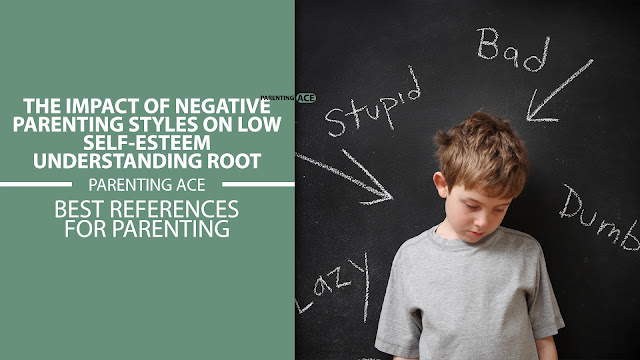The Impact of Negative Parenting Styles on Low Self-Esteem: Understanding the Root Causes and Breaking the Cycle
In the intricate tapestry of parenting, one thread holds immense significance: its impact on a child's self-esteem. Low self-esteem, often rooted in negative parenting styles, can cast long shadows over a child's life, affecting their confidence, resilience, and overall well-being. In this blog post, we unravel the profound relationship between parenting styles and self-esteem, exploring how understanding this dynamic can empower parents to cultivate environments that nurture self-worth and fortitude in their children.
 |
| The Impact of Negative Parenting Styles on Low Self-Esteem: Understanding Root Causes and Breaking the Cycle |
Parenting plays a pivotal role in shaping a child's self-esteem, with negative parenting styles having profound consequences on their psychological well-being. Low self-esteem, characterized by a negative self-image and lack of confidence, often stems from experiences of neglect, criticism, or overbearing control within the family environment. In this article, we delve into the detrimental effects of negative parenting styles on a child's self-esteem, exploring the root causes and strategies to break the cycle for a healthier upbringing.
The Link Between Negative Parenting Styles and Low Self-Esteem
Negative parenting styles, such as authoritarian and uninvolved parenting, can significantly contribute to the development of low self-esteem in children. Authoritarian parents, with their strict rules and lack of emotional support, may create an environment where children feel inadequate and fearful of making mistakes. On the other hand, uninvolved parents, who are emotionally distant and neglectful, fail to provide the necessary validation and encouragement for their children to develop a positive sense of self-worth.
Impact on Self-Perception and Emotional Well-Being
Children raised in environments characterized by negative parenting styles often internalize the critical messages they receive, leading to distorted self-perceptions and feelings of worthlessness. Constant criticism or indifference can erode a child's confidence and leave them vulnerable to developing anxiety, depression, or other mental health issues later in life. Moreover, low self-esteem can manifest in various behavioral patterns, such as seeking validation from external sources or engaging in self-destructive behaviors as a coping mechanism.
Breaking the Cycle: Strategies for Positive Parenting
Breaking the cycle of negative parenting styles requires a concerted effort to cultivate a supportive and nurturing family environment. Parents can adopt authoritative parenting techniques, characterized by warmth, responsiveness, and reasonable expectations, to foster a sense of autonomy and competence in their children. Effective communication, active listening, and validation of emotions are essential components of building a child's self-esteem and resilience.
Additionally, parents should strive to model healthy self-esteem through their own actions and interactions, demonstrating self-confidence, self-respect, and acceptance of imperfections. Creating opportunities for children to explore their interests, set goals, and experience success in a safe and supportive environment can also contribute to building self-esteem. Counseling or therapy may be beneficial for both parents and children to address underlying issues and develop healthier family dynamics.
The impact of negative parenting styles on a child's self-esteem cannot be understated, with far-reaching implications for their emotional well-being and future success. By recognizing the root causes of low self-esteem and actively working to break the cycle through positive parenting practices, parents can empower their children to develop a strong sense of self-worth, resilience, and confidence. Ultimately, fostering a supportive and nurturing family environment lays the foundation for children to thrive and fulfill their potential in life.




